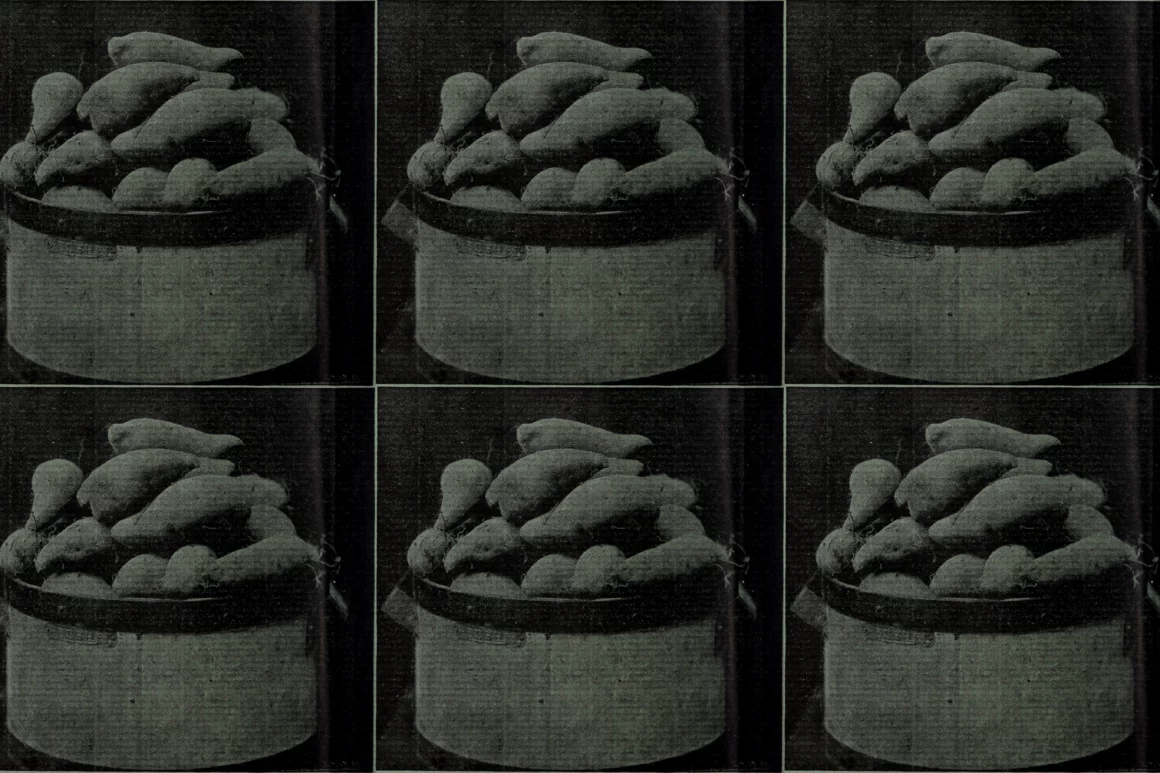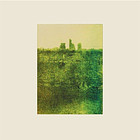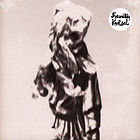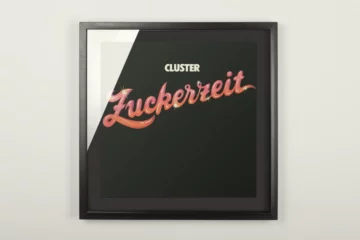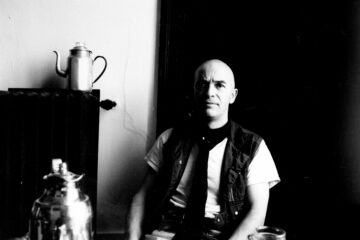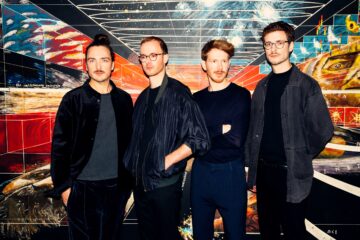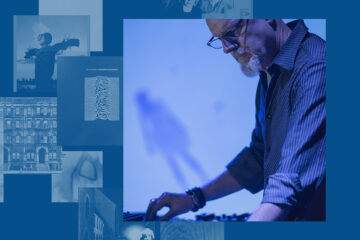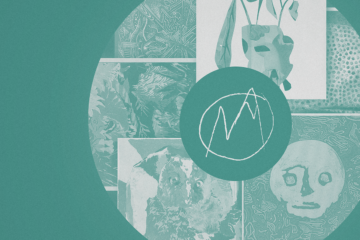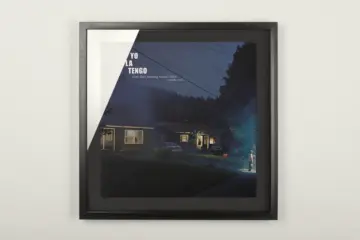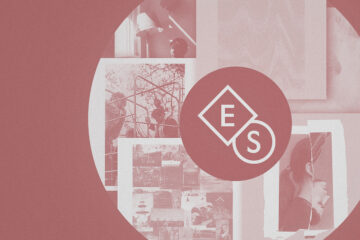Anyone who has ever eaten really good Franconian bread made from rye sour dough knows that there is no way around them: caraway seeds. And that, as we all know, is where opinions differ. Some love them, others turn up their noses.
Brannten Schnüre come from Würzburg in Lower Franconia. They remind you a bit of caraway. Some have been celebrating the duo – consisting of Christian Schoppik and Katie Rich – as the wistful-romantic-post-industrial-ambient-folk sound we can’t get enough of since »Sommer im Pfirsichhain« (released on Aguirre Records in 2017) or »Erinnerung an Gesichter« (2019) at the latest, while others are still wondering what all the noise is about. Is it art or hyper-Germanness?
The year 2022 saw the release of their last LP on their own label Quirlschlängle, and now they are about to release a compilation with the mystical name »Gespensterland« (Ghost Land) on Bureau B. It features not only Brannten Schnüre, but also other bands from their close scene. A scene that may not be a scene at all, but is skilfully and ironically staged as one – as difficult to label as the music from Brannten Schnüre. The bands have fairytale names: Baldruin, with whom Schoppik already released their first EP in 2011, Freundliche Kreisel, Kirschstein and Balint Brösel.
All the songs on the compilation are previously unreleased, though not brand new. Some have even outlived their creators: Kirschstein and the neofolk Balint Brösel, two bands from the Ruhr area, have now split up.
Johannes Schebler a.k.a. Baldruin only recently released his latest album »Relikte aus der Zukunft« on the Peruvian label Buh! in June this year. With his experimental, sometimes playful, sometimes nostalgic-hallucinatory ambient, his songs blend discreetly but harmoniously into the mix on the compilation. And for the electro-acoustic trio Freundliche Kreisel, whose album of the same name was released on Stroom last year, Schoppik and Rich teamed up with Johannes Schebler.
Officially, they don’t talk to the press – it’s all about the music and not the people behind it. As luck would have it, however, Schoppik lets a very personal relic from the future slip out over drinks in a Caribbean cocktail bar: Brannten Schnüre’s next and final album will be released in 2024. It will be called »Landschaft aus Tränen« (Landscape of Tears), and Schoppik has once again delved deep into his sound archives, assembling a variety of samples from sources as diverse as cloyingly romantic films and telenovelas. A bit of kitsch, a bit of nostalgia, not entirely serious – or maybe it is? It all remains very mysterious, but we can drop a little spoiler: Fans of the trash TV classic »Das perfekte Dinner« the German equivalent of Channel 4’s »Come Dine with Me« in the UK will be right in their element. Sounds absurd – and that’s exactly how it’s supposed to sound.
Middle-class German poltergeists
Mystical, absurd, mysterious: that’s what »Gespensterland« (Ghost Land) sounds like too. The compilation format seems to be the common denominator in the work by all the artists involved. It’s about topics like dissociation and disembodiment in all their facets. About supernatural phenomena – sometimes loud, sometimes quiet. Poltergeists are in their element here and can throw pots and pans around to their heart’s desire. There are also the ghosts of the past, as well, that convey a deep nostalgia, such as on the song »Disco Disco«. Based on Sugalo’s song of the same name, Katie Rich sings about the questions and pains of growing up in her usual childlike, questioning way. Coming of age in the shell of an almost indie pop song. Even if the title is deceptive, the music played by these artists is not meant to be spooky. It’s meant to be healing.
»The fantasy of a doomed future unwinds on every track.«
All the songs have something to do with ghosts – without seriously believing in them, Schoppik makes that clear. »Gespensterland« seems more like an archive of such phenomena, a way of holding on to them. It’s like a curiosity cabinet for the ears.
Kirschstein’s songs also all have something rapturous, hallucinatory to them, even somehow comical. And they go hand in hand with the imagery of Brannten Schnüre: there are supermarkets, building sites in a new housing development, a deliberately staged urban anti-nature folk that wants to be anything but German. And this urban folk, which sometimes sounds so irritatingly German in its romantic return to the art song, but which makes a mockery of the whole thing, is the common denominator with all Gespensterland artists.
Related reviews
Baldruin
Mosaike Der Imagination
Brannten Schnüre
Aprilnacht
Various Artists
Gespensterland
Baldruin
Relikte aus der Zukunft
»Gespensterland« could also be read as a contribution to a German response to Mark Fisher’s hauntological theories, the press release continues. »On each track, the fantasy of a doomed future unwinds, a narrative thread long interrupted, a dreamscape forever unredeemed and now spooking around in the dull grey corridors of the post-historical present because of it.« But maybe this is all too far fetched? Aber vielleicht ist das alles auch viel zu weit hergeholt?
The artists on »Gespensterland« can be many things. A playground for Mark Fisher fans, who now have the chance to finally project hauntology onto a practical example. Or simply a way of processing of the immediate environment in which the artists grew up – always somewhere between the Ruhr and Franconia, it seems: German middle-class kids, their wishes, their thoughts and, above all, their desires. Brannten Schnüre process all of this in their songs – but nothing too exotic. Maybe that’s what seems so German to so many. And in the words of Brannten Schnüre: »Lieder vom Leben, Lieder vom Tod, die fangen an und hören auf, im Supermarkt, beim Schlussverkauf« (Songs of life, songs of death, they begin and end, in the supermarket, at the sale).

